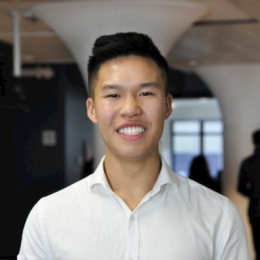How to manage your side hustle and internships while studying full-time
Translating a great start-up idea into a viable business requires hard work, effective time management, resourcefulness and resilience, according to graduand Michael Liang.
Translating a great start-up idea into a viable business requires hard work, effective time management, resourcefulness and resilience, according to graduand Michael Liang.

For 18 months and counting, UNSW Business School graduand Michael Liang has been working on his side hustle, Tribespot – a recruitment software solution designed for student society executives.
“I created this app to address a gap in the student recruitment services market. During my time at UNSW, I was an executive of the 2017 Business Society and I found that screening student applications was quite a lengthy process,” Liang says.
“I saw many student society executives going through the recurring recruitment cycles with bags under the eyes each trimester and working around the clock to speed up the process as fast as they possibly could. To me, this was a problem at hand that needed solving and it gave me the motivation to create an app to streamline the process.”
To put this into perspective, administrative tasks such as screening applicants and interview scheduling usually take about 25-30 hours per week. However, with the help of Tribespot, time spent on manual tasks can drop to about 10 hours a week.
The process becomes more efficient as Tribespot integrates the full G-suite such as Google sheets, Google forms and Gmail into the app and adds automated features to make the recruitment process run more cohesively. Tribespot also enables student societies to beat the competition and secure talent faster.
“Competition for great student leaders is often fierce – especially amongst larger student societies – to the point that some societies will withdraw an offer if an applicant has accepted a role with another society,” he says.
“With Tribespot, a student society will be able to recruit faster and send out their offer to the candidate first. As such, they will have the competitive advantage of securing better and more committed talent.”
Tribespot users will also be able to spend their spare time on other meaningful tasks such as organising student events, studying or simply enjoying their university experience more.
It was only after enrolling in one of the UNSW Business School’s courses that Liang realised that he wanted to put his knowledge of coding to good use and launch his own start-up.

UNSW Graduand Michael Liang
“In 2017, I enrolled in Information Systems Project 1 course and I had to come up with a working prototype as one of the requirements of the course – which is how I came up with the idea for Tribespot. Together with my classmates, we learned how to code and had ample support from the staff,” Liang explains.
Information Systems and Technology Management Lecturer Sandeep Mysore Seshadrinath further explained that this practical course “provides students with a safe place to design and create prototypical implementations of digitally enabled solutions using contemporary approaches such as Design Thinking, to solve real-world problems sourced from corporates, not-for-profit organisations and government agencies. This early exposure to real-world challenges equips students with the tools and temperament required to navigate the complexities of everyday professional work - be it in an established corporation or an up-and-coming start-up”.
While Tribespot was in the works, Liang also completed an internship at Microsoft in 2018 and Atlassian in 2019. During the trimester, he split his time between working three days a week and dedicating Saturdays to Tribespot. Liang mentioned that time management played a crucial part in the lead-up to the launch and he was only able to achieve a lot in his day by waking up at 4 am and putting in three to four hours into Tribespot before heading into work or class.
“Once I gave a name to my side project, it became a real entity in my mind – one that I could prioritise against competing commitments,” he says, in response to how he managed his side hustle alongside internships and full-time study.
Liang was also the recipient of the New Colombo Plan Scholarship – an initiative that the Australian Government launched to encourage Australians to study and work in the Indo-Pacific region. Through this scholarship opportunity, Liang participated in an exchange program at Fudan University in Shanghai to finish his degree. Upon his graduation, Liang plans to move to Shenzhen – the ‘Silicon Valley of China’, to fully explore the start-up opportunities for Tribespot.
“You don’t have to drop everything if you want to get a start-up off the ground. If you are passionate about something, I believe in trying it out as a side project before moving it into a full-time gig. Find out if this is really what you want first,” he advises.
Tribespot is currently run by a team of five and is based in Sydney, Australia. The app is currently servicing four of the Go8 universities – UNSW, The University of Sydney, The University of Melbourne and Monash University – and looking to expand to other universities over the next few years.